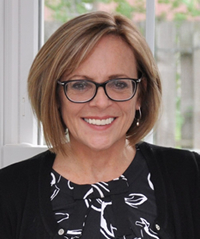Find a CBT Therapist
Search through our directory of local clinicians.
Nadine Fish

Featured Therapist Interview
I received my Masters in Social Work from Western Michigan University. Prior to starting my own practice, I worked as an Outpatient Therapist at Riverwood Center for nine years. During that time, I became a Certified Advanced Alcohol and Drug Counselor. It wasn’t long before I realized that Cognitive Behavioral Therapy (CBT) was my greatest passion. I am certified in CBT and am a Diplomate of the Academy of Cognitive Therapy. Using CBT, I treat alcohol and drug abuse, depression, generalized anxiety disorder, OCD, panic disorder, and specific phobias.
Therapy is your personal opportunity to experience growth while receiving support during challenging times in your life. It will help you to work through personal topics, such as anger, depression, anxiety, substance abuse, relationship challenges, parenting problems, career changes, etc. Using CBT, I will help you to explore your feelings, beliefs, and behaviors; work through challenging or dysfunctional thoughts; and identify aspects of your life that you would like to improve. In session, you will learn to better understand yourself and others, set personal goals, and ultimately work toward your desired changes.
“As a cognitive behavioral therapist, I’m passionate about helping people through CBT. I love seeing the progress my clients make when they realize their power. By changing their perspective, they are able to change their lives.”
You can read more at http://www.hopereborncounseling.com/
First, we would like to know a little about your practice.
What are your personal strengths as a practitioner?
My strength as a practitioner is my intimate knowledge on issues faced by my clients. Before becoming a therapist, I had suffered for years from anxiety and panic, and I learned to overcome it. I have since made it my mission to help others to learn that they, too, can be free of this debilitating disorder.
What “tips” can you offer to colleagues just opening a practice?
I have been a business owner for many years. I started in my twenties as a part owner of a manufacturing company and then for the past 13 years I have owned a home-care franchise. Being an entrepreneur before starting my own practice allowed me additional knowledge and confidence. Although experienced in business, working with insurance companies was completely new to me and has been one of the hardest aspects of owning a private practice. I would suggest that anyone new to owning a business find a mentor to help guide them.
How do you remind your patients of their strengths during the therapy process?
I search for and acknowledge my clients’ strengths from day one of our time together. I also have them identify their progress each session and I validate their awareness and the work they are doing to improve their lives.
Are you involved in other types of professional activities in addition to your private practice?
I work part-time at a CMH and also own a home-care franchise.
We would also like to know a little about you personally.
Who was your mentor?
A college professor who encouraged me to follow my dreams.
When not practicing CBT, what do you do for fun?
I mostly listen to audio books (60% for education). I also enjoy running 5Ks, decorating, and playing cards.
We are also interested in some of your views of CBT.
What do you think is the single most important thing CBT can do for your clients?
CBT has helped my clients see things in a completely new way and their negativity is replaced by hope.
Where do you see the field of the behavioral therapies going over the next 3-5 years?
I believe that behavioral therapies will continue to be the way of treating autism, ADHD, depression, drug abuse, OCD, and phobias. Also, there will likely be more opportunities to see a therapist online, which will remove location limitations.
How do you use the local or social media to educate your community on the benefits of CBT?
I manage a Facebook page, a Psychology Today listing, and a website explaining how CBT can help my clients learn skills to think in different ways and to help them to overcome their panic disorder (which is what I specialize in).
Finally, we would like to know your opinions about ABCT.
How long have you been a member of ABCT?
I became a CBT diplomate in 2012 and joined ABCT in 2018.
How has ABCT helped you professionally?
ABCT has made me known to those seeking a certified practitioner.
What services do you consider the most valuable from ABCT?
Being listed on the website is most valuable to me.
Thank you for taking the time to answer our questions!
My Account Info
Manage your Membership information, email preferences, and more.
Journals
Membership in ABCT grants you access to three journals.
Convention
We are now accepting Abstract submissions for Continuing Education Ticketed Sessions at the 2024 ABCT Convention in Philadelphia, PA.
My Account Info
Manage your Membership information, email preferences, and more.
Journals
Membership in ABCT grants you access to three journals.
Convention
We are now accepting Abstract submissions for Continuing Education Ticketed Sessions at the 2024 ABCT Convention in Philadelphia, PA.
